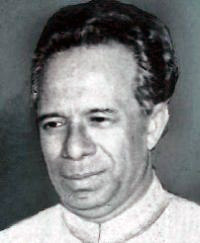Humayun Kabir | |
|---|---|
 | |
| Minister of Education | |
| In office 1 September 1963 – 21 November 1963 | |
| Prime Minister | Jawaharlal Nehru |
| Preceded by | K. L. Shrimali |
| Succeeded by | M. C. Chagla |
| Personal details | |
| Born | 22 February 1906 Komarpur, Bengal, British India |
| Died | 18 August 1969 (aged 63) Kolkata, West Bengal, India |
| Alma mater | Presidency University, Kolkata, Calcutta University, Exeter College, Oxford |
Humayun Kabir (1906-1969) was an Indian educationist and politician. He was also a poet, essayist and novelist in the Bengali-language. He was also a renowned political thinker. He was educated at Exeter College, Oxford and graduated in 1931. Kabir had been heavily involved with the Oxford Union during his student days, having been elected secretary in 1930 and librarian in 1931. He made his farewell speech on the motion: 'This House condemns the Indian policy of His Majesty's Government'. Kabir had also been involved with the student newspapers, the Isis and the Cherwell, and the Oxford Majlis journal, Bharat. Upon his return to India, Kabir taught at a number of universities. He also became involved in trade union politics and was elected to the Bengal Legislative Assembly in 1937. He took up a number of government posts after 1947, including Minister for Education.
Kabir published a book of poems in Oxford in 1932, and continued to write poetry, short stories and novels after his return to India. He also wrote essays and was a well-respected orator. He died in Kolkata in 1969.[1]
- ^ "Humayun Kabir | Making Britain". www.open.ac.uk.